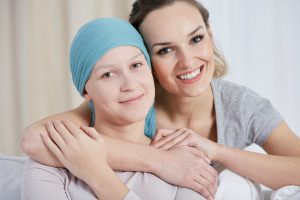Sexual Problems Continue for Young Cancer Survivors

Cancer and its treatment can lead to a number of sexual problems for patients and survivors, including painful intercourse, erectile dysfunction (ED), and trouble with orgasm. Now, new research suggests that over half of younger survivors experience such problems, some for at least two years.
Researchers asked a group of young adult cancer patients between the ages of 18 and 39 to complete a questionnaire on medical outcomes and sexual functioning. One hundred twenty-three people filled out the questionnaire within four months of their cancer diagnosis. One hundred seven repeated the process six months later, and 95 did so a third time at a 24-month follow up point.
Each time the researchers tallied the results, they found that over half of the respondents reported sexual problems and that the probability of dysfunction and psychological distress increased over time. Two years after diagnosis, about 53% still had some degree of sexual dysfunction.
At the start of the study, almost 58% of the participants had romantic partners, but two years later, the figure dropped to 43%.
Women were among the participants most likely to experience sexual issues. Other high-risk groups were older patients, those who were married or in a committed relationship, those who had undergone chemotherapy, those with psychological distress, and those with less social support.
Being in a relationship was linked to worse sexual function for women, but relationship status was not a contributing factor for men.
“We concluded that sexual functioning is experienced differently among males and females. For a young woman, especially, a cancer diagnosis can disrupt her body image, the intimacy with the partner and the ability to engage in sex,” lead author Chiara Acquati told the University of Houston, where she is a professor at the Graduate College of Social Work.
She added: “Results from this study emphasize the need to monitor sexual functioning over time and to train health care providers serving young adults with cancer in sexual health. Furthermore, patients should be connected to psychosocial interventions to alleviate the multiple life disruptions caused by the illness and its treatment.”
The study was published in November 2017 in Cancer, the journal of the American Cancer Society.
For more information on cancer’s effects on sexual function, please see these links:
How Does Cancer Affect Men’s Sexual Health?
The Effects of Cancer on Women’s Sexuality
Resources
Cancer
Acquati Chiara, PhD, et al.
“Sexual functioning among young adult cancer patients: A 2-year longitudinal study”
(Abstract. First published: November 17, 2017)
http://onlinelibrary.wiley.com/doi/10.1002/cncr.31030/abstract
CancerNetwork.com
Lawrence, Leah
“Problems With Sexual Function Persist After Cancer Diagnosis in Young Patients”
(November 30, 2017)
http://www.cancernetwork.com/news/problems-sexual-function-persist-after-cancer-diagnosis-young-patients
Contemporary OB/GYN
Kronemyer, Bob
“Cancer adversely affects sexual functioning in young adults”
(January 22, 2018)
http://contemporaryobgyn.modernmedicine.com/contemporary-obgyn/news/cancer-adversely-affects-sexual-functioning-young-adults
University of Houston
Stipes, Chris
“After the Diagnosis: How Cancer Affects Sexual Functioning”
(December 20, 2017)
http://www.uh.edu/news-events/stories/2017/december/12202017Acquati.php
You may also be interested in...
Other Popular Articles

What Is the Average Penis Size?
If you have ever wondered how your penis compares to others in terms of size, you are not alone. Many men are curious to know how their penises stack up compared to the average. Unfortunately, general curiosity can sometimes give way to full-on obsession and anxiety about penis size. This can be an unhealthy and often unnecessary fixation, especially because most men who think their penises are too small have perfectly normal-sized penises.

What Is Jelqing, and Does It Actually Work?
The term “jelqing” refers to a set of penis stretching exercises that some believe can make the penis bigger. Although the practice has gained attention and popularity in blogs and internet forums in recent years, there is no scientific evidence that it is an effective way to permanently increase the size of one’s penis. In fact, in some cases, jelqing may actually cause damage to the penis, so it is a good idea to get all the facts before setting off to try it.

What Is Sensate Focus and How Does It Work?
Sensate focus is a technique used to improve intimacy and communication between partners around sex, reduce sexual performance anxiety, and shift away from ingrained, goal-oriented sexual patterns that may not be serving a couple.

Can Sex Reduce Menstrual Cramps?
The SMSNA periodically receives and publishes ‘guest editorials.’ The current article was submitted by Mia Barnes, a freelance writer and researcher who specializes in women's health, wellness, and healthy living. She is the Founder and Editor-in-Chief of Body+Mind Magazine.
Having sex while you experience menstrual cramps is healthy and can provide significant benefits. While it might not be the first activity that comes to mind when your PMS or period cramping begins, many people enjoy sex to reduce menstrual cramps, experience increased pleasure and benefit from other advantages. Learn more about having sex while menstrual cramps are happening and how it can help your body.

How Long Does It Take the Average Man to Ejaculate?
On average, it takes a man between 5 to 7 minutes to orgasm and ejaculate during sexual intercourse.

Can Sex Throw off Your Vaginal pH Balance?
The SMSNA periodically receives and publishes ‘guest editorials.’ The current article was submitted by Mia Barnes, a freelance writer and researcher who specializes in women's health, wellness, and healthy living. She is the Founder and Editor-in-Chief of Body+Mind Magazine.
Your vagina is a pretty powerful organ. It is a pathway for menstrual blood and babies. It also is a main player in sexual intercourse. You might hear about your vagina’s pH and worry that yours is at risk. Here’s what to know about vaginal pH, including the impacts sex could have.
You are prohibited from using or uploading content you accessed through this website into external applications, bots, software, or websites, including those using artificial intelligence technologies and infrastructure, including deep learning, machine learning and large language models and generative AI.

